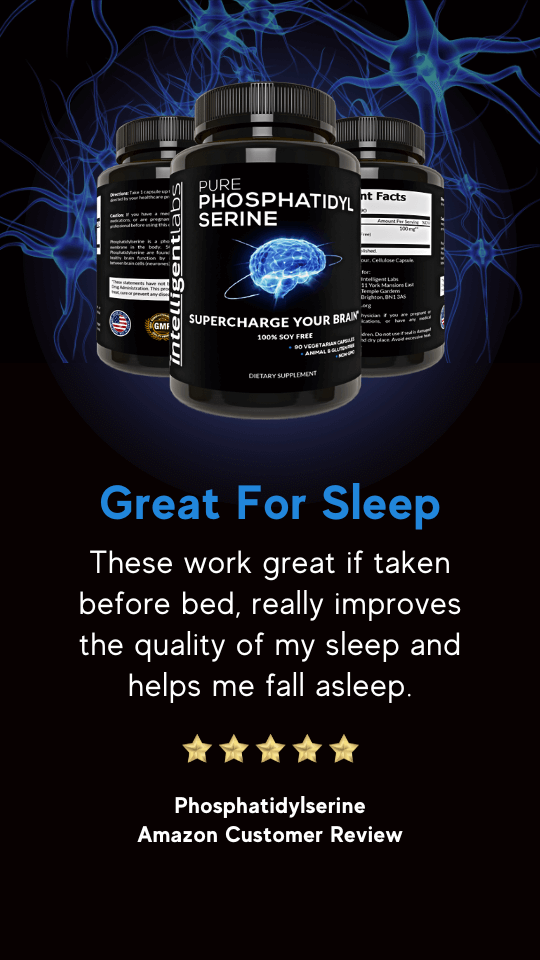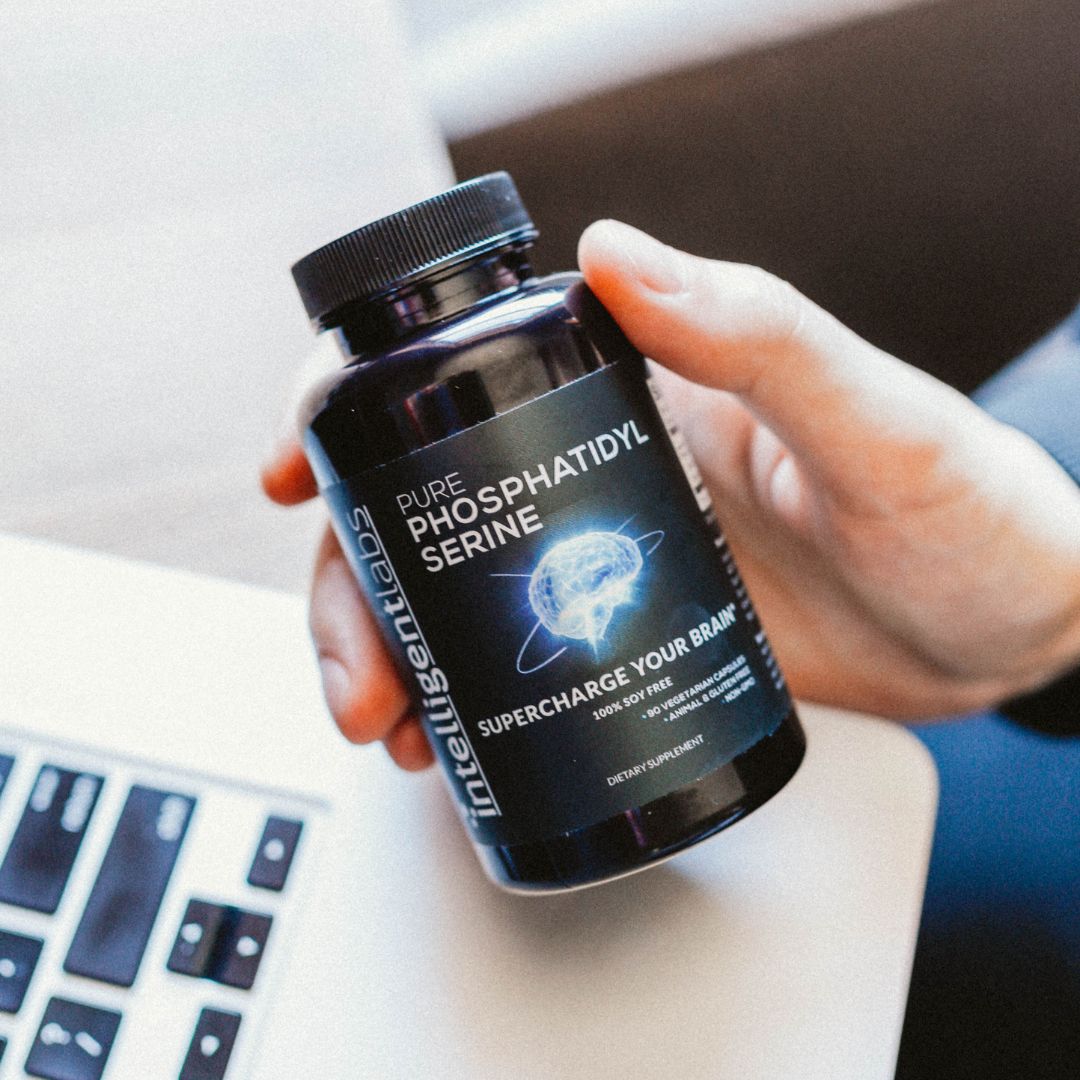Having trouble sleeping at night because you’re too anxious and stressed out? What if we tell you that Phosphatidylserine, a nootropic known for its brain-boosting benefits, may be the right sleep aid for you? Surprised? Well, don’t be because there’s science to support Phosphatidylserine’s effects on sleep and anxiety!
In this blog post, we’ll walk you through some of the reasons why stress and anxiety can have such a negative impact on sleep (this is Part 1). We would recommend giving it a read to better understand the topic. But if you’d like to go directly to the section that discusses Phosphatidylserine’s role in sleep (Part 2), then feel free to click on the relevant section in the Table of Contents below.
Table of Contents
Part 1: An Overview of Sleep and Anxiety
What happens when you’re sleep deprived?
Failure to get a good night’s sleep can make you feel unfocused, sluggish, and very sleepy in the morning. This can lead to poor decision-making and bad performance, a dangerous combo especially when driving or handling machinery (1)!
While power naps can give you an energy boost, it’s still not a good substitute for regular sleep at night. Experts recommend at least 7 hours of sleep. Regularly failing to do so may lead to health issues, such as poor immunity, weight gain, obesity, diabetes, depression, heart disease, and stroke (2).
If you’re wondering what’s the relationship between sleep and weight, check out this blog post on how the lack of sleep can make you fat.
How do stress and anxiety affect sleep?
Sleep is impossible when you can’t stop worrying about money and relationship problems, safety concerns, illness, and a myriad of other stressors out there!
As you can imagine, these stressors can make your thoughts race well into the night. They can make your heart beat super-fast, give you stomach cramps, make your mouth go dry, and other physical manifestations of stress and anxiety. These are signs that your body is producing excessive amounts of the stress hormone called cortisol (3).
So, what does cortisol have to do with sleep (or the lack thereof)?
Cortisol may be commonly known as the stress hormone, but that’s not all it does. It affects nearly every organ system in the body, including regulating the body’s sleep-wake cycle. Keeping cortisol levels well-balanced is necessary not just for a good night’s sleep but also for our overall wellness (4).
Cortisol and other hormones that influence the sleep-wake cycle are produced by the hypothalamic-pituitary-adrenal (HPA) axis. Disruption of these hormones can have drastic effects on sleep quality. Likewise, poor sleep can further aggravate and hyperactivate the HPA axis (5)! So, it’s a bit of a chicken-and-egg situation…
Fortunately, there is evidence to show that Phosphatidylserine may help normalize HPA axis activity and regulate cortisol production. This means that Phosphatidylserine may help reduce stress and anxiety, and improve sleep as well!
Part II: How Phosphatidylserine Can Help With Sleep and Anxiety
What is Phosphatidylserine?

Phosphatidylserine (PS) is a type of phospholipid (fat). Phospholipids form part of our cell membranes, that is, it’s present in all 20 trillion cells in the body. That said, the highest concentrations of PS are found in the walls of brain cells, where it comprises 10-20% of total phospholipids (6).
Phosphatidylserine’s claim to fame is actually its nootropic and brain health benefits. This is because PS helps our brain cells communicate with each other. It promotes energy metabolism in the brain, making it essential for memory and other cognitive functions.
Additionally, PS is also involved in the production of key neurotransmitters, namely, acetylcholine, norepinephrine, serotonin, and dopamine.
Studies have shown that PS may help with cognitive decline, depression, early-stage Alzheimer’s, multiple sclerosis, and even athletic performance. We covered PS benefits extensively in our ultimate guide to Phosphatidylserine if you’d like to know more about them.
How can Phosphatidylserine help with sleep and anxiety?
Phosphatidylserine’s effect on sleep occurs through different pathways. Here are some of them:
* Phosphatidylserine supplementation helps increase PS levels in the brain
Increased Phosphatidylserine levels in the brain normalize cortisol levels, making stress and anxiety levels go down, too (7, 8).
To elaborate, researchers studying animals with Parkinson’s disease observed critically low levels of PS in the subjects’ brains. The animals also had sleep problems. But PS supplementation restored brain PS levels to normal. Consequently, sleep patterns went back to normal, too (7). This study shows that sufficient PS in the brain may help promote better sleep quality.
An earlier human study reported similar findings, too. Volunteers were given either 400mg, 600mg, or 800mg of Phosphatidylserine daily for three weeks. Those who took the lowest dose (400mg) came out ahead in the stress tests and had lower cortisol levels overall. They also seemed to enjoy better moods and were less distressed by the tests (8).
* Phosphatidylserine helps regulate serotonin
Remember how Phosphatidylserine is involved in neurotransmitter production? Well, keeping healthy levels of serotonin is also important when it comes to quality sleep.
Symptoms of low serotonin include poor concentration, feeling low, and sleep problems. Fortunately, there is evidence that taking PS supplements may help increase serotonin, meaning it may also help improve mood and sleep (9)!
* Phosphatidylserine helps re-sensitize cortisol receptors
Additionally, when cortisol levels are chronically raised, receptors in the brain can lose sensitivity, so cortisol production isn’t switched off. Phosphatidylserine can help re-sensitize these receptors so they can send the message to the adrenals to switch off cortisol production (10)! This leads to lower cortisol levels, less anxiety and stress, and, ultimately, better sleep.
So, what can we take away from these studies?
Well, since elevated cortisol levels can disrupt sleep, then it follows that Phosphatidylserine’s cortisol-lowering effect may also help reduce stress and anxiety and therefore improve sleep quality, too.
What’s the best source of Phosphatidylserine?

Phosphatidylserine is found in food sources like soy, white beans, egg yolks, and organ meat like liver and kidney. However, studies point to supplementation as the most effective means of increasing PS levels in the brain (yes, it can cross the blood-brain barrier).
But not all PS supplements are created equal. We would recommend staying away from products made from cow brains due to the risk of prion transmission (aka mad cow disease).
For best results, we recommend you take our Intelligent Labs Phosphatidylserine supplement. Each capsule contains 100mg of Phosphatidylserine made from soy-free sunflower lecithin. Anyone allergic to soy can safely enjoy the benefits of our Phosphatidylserine!
How much Phosphatidylserine to take for sleep and anxiety?
Most studies consider 300mg to 800mg as a safe range for Phosphatidylserine supplementation (11, 12). Since PS is a phospholipid, it needs to be taken with food that contains fat to aid absorption.
For our Intelligent Labs Phosphatidylserine, we would recommend taking one capsule (100mg dose) three times a day. So, one capsule each at breakfast, lunch, or dinner, adding up to 300mg daily. This dosage is typically enough to help reduce stress and improve sleep quality.
However, if you feel like the dose isn’t enough, you may slowly adjust the dosage by 100mg every few days (do not try to go beyond 800mg/day) until you find the dose that works for you. While Phosphatidylserine is relatively safe even at higher doses, we would highly suggest speaking with your doctor before taking this product.
Conclusion
As we’ve learned in this blog post, Phosphatidylserine can effectively normalize cortisol levels. This may lead to reduced stress and anxiety, and improved sleep as well. This is wonderful news because quality sleep is important to help you get your mental faculties and cognitive skills in order. You need them when dealing with all the stressors in your life!




